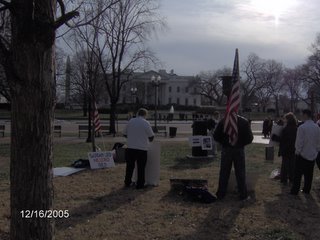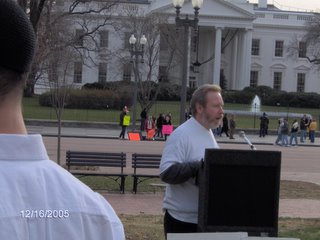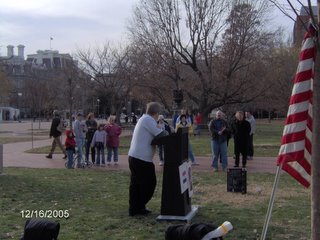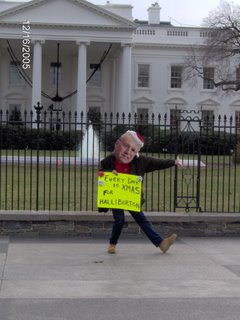Bon Voyage!
Yesterday I went up to Washington DC to see off a young Iraqi man who is going back to visit the country of his birth. I forget exactly how long he said he would be gone, but I seem to recall it as a month or so.
He is today an American citizen, and has one of the most amazing life stories that I have ever heard. He is also a very impressive person in his own right, someone that I predict will make a name for himself.
His name is Jesse Kaveh, and here is his story, as told to Jamie Glazov of FrontPage Magazine:
The "U.S. Soldiers" Kaveh refers to were Special Forces guys operating in the area. Keep in mind that this was before the Gulf War. In other words, they were on a "black" mission, in a country that we were not officially fighting.
They could have just left the young Jesse there. If they took him back there was no guarantee they could get him into the United States. The State Department might have considered their action kidnapping a foreign national.
But they took Jesse, and a young girl that they found, back with them to their base in Turkey. After some wrangling, they were granted entry into the United States, and both were adopted by families. Jesse found a home in the Washington DC suburbs.
So much for John Kerry's view that American soldiers are "terrorizing" Iraqi women and children.
And, as you might imagine, Jesse is an enthusiastic supporter of Operation Iraqi Freedom.
I first met Jesse at the counter rally to the the anti-war protests in Washington DC on September 24 of this year. He has since been a regular at our Friday night rallies outside Walter Reed Army Medical Center as we counter Code Pink and their ilk (go to The Redhunter, my home website and select "Rallies and Protests" at right).
Soon he will take a trip back to the Kurdish region of Iraq, where he will spend a few weeks with relatives. When he gets back I will try and find out about the trip, and if he is going to post anything about it.
Lafayette Park, Washington DC
Early this afternoon a handful of us went uptown to give Jesse a goodbye.
Lafayette Park is just north of the White House, which you will see in the background of these photos. It is the site of daily protests by groups ranging across the spectrum from right to left. Today I could see at least two other groups besides ourselves.
One of our party had a portable podium and sound system, and for a few hours people spoke about freedom and the war. Jesse was just finishing up as I arrived, and I did not get a good photo of him.


I'm the guy in the red hat in this next one. Jesse is in the white shirt and skullcap.

In the background of this next photo you can clearly see the White House. To the left of our speaker, Kristinn, you can see some people with bright pink and yellow signs. They are members of Code Pink, a radical leftist group that also protests outside of Walter Reed Army Medical Center every Friday night. We counter them each Friday night with a rally of our own. Small world, we meet again at Lafayette Park.

Passers by sometimes stopped and listened. Some took photos, and we got a few thumbs up. Others debated us for a bit.

After the rally ended, I walked closer to the White House so I could get better photos of the leftists.
Lo and Behold, one of the leftists I ran into was none other than "Squeeje Man", a regular Pinko at the Friday night anti-war protests. He is so named because during the summer he would go into traffic when cars were stopped at the light and try to hand the drivers literature.
He no doubt recognized me, and was obliging enough to pose for a photo

I don't know who the group was behind this display.

What a country.
He is today an American citizen, and has one of the most amazing life stories that I have ever heard. He is also a very impressive person in his own right, someone that I predict will make a name for himself.
His name is Jesse Kaveh, and here is his story, as told to Jamie Glazov of FrontPage Magazine:
Under Saddam Hussein, my family witnessed more atrocities than are reported or even imagined by any human rights group. After the gassing of Halabja, my home town, things had never been brought back to any sense of normalcy. There were constant raids upon the town as well as surrounding areas in which Saddam's Fedayheen would randomly storm peoples’ homes and find males between the ages of 16-35 and label them as rebels. Several family members disappeared but no one would say anything.
There were soldiers stationed everywhere and no one knew where Saddam's secret service was. He had agents in what appeared to be every market place and cafe and so people were always looking over their shoulder and would try to avoid large gatherings. Everyone watched what they said and kept conversations to very general terms and people were rarely close.
One night in particular stands out above all other nights. On May 16, 1989 (I only know the date because of what happened), I remember it was raining really hard. My mother had me in her arms and we were over at my uncle’s home -- which was right down the road from where he had a small farm.
A large group of soldiers kicked in the door and started shouting. We all were put on the ground, noses touching the floor, while family members were kicked and one of my cousins I later found out was raped. They had an order from a Baath party official that my uncle was supplying the Iranians with food and he was a traitor. They grabbed him and bound him along with his three sons. Everyone knew what would happen but at the same time we knew there was nothing we could do to stop it.
Raids in my part of Halabja continued until the night my mother and father were murdered. This happened on December 13, 1990. It was dark outside and my mother, father and I were huddled next to the fire. The soldiers in black, as well as several others, came banging on the door that night. They came to round up what they deemed as more rebels. This time it was my father. My father was never a rebel; he was a farmer. Nonetheless, it was Saddam's orders and his personal militia from Tikrit that came and dragged him out of the home. Before they opened the door, my mother told me to go run and hide. I hid in a crawl space in my parents’ room by the stairs. I heard my mother screaming and pleading with the soldiers and a father's deep voice also saying something. After a very short time, BANG, and the deep voice stopped and my mother replaced that voice with screams. Then, BANG, the screams stopped and all that was heard was the jeep leaving.
I didn't know what was going on and then another small group of men entered the home. I thought the men in black had come to get me too and they had found me. The difference was these men in black were U.S. soldiers operating in the area at the time. They came to see what had happened and rescued me and another person.
My family personally witnessed one-third of their relatives dragged away never to be seen again.
The "U.S. Soldiers" Kaveh refers to were Special Forces guys operating in the area. Keep in mind that this was before the Gulf War. In other words, they were on a "black" mission, in a country that we were not officially fighting.
They could have just left the young Jesse there. If they took him back there was no guarantee they could get him into the United States. The State Department might have considered their action kidnapping a foreign national.
But they took Jesse, and a young girl that they found, back with them to their base in Turkey. After some wrangling, they were granted entry into the United States, and both were adopted by families. Jesse found a home in the Washington DC suburbs.
So much for John Kerry's view that American soldiers are "terrorizing" Iraqi women and children.
And, as you might imagine, Jesse is an enthusiastic supporter of Operation Iraqi Freedom.
I first met Jesse at the counter rally to the the anti-war protests in Washington DC on September 24 of this year. He has since been a regular at our Friday night rallies outside Walter Reed Army Medical Center as we counter Code Pink and their ilk (go to The Redhunter, my home website and select "Rallies and Protests" at right).
Soon he will take a trip back to the Kurdish region of Iraq, where he will spend a few weeks with relatives. When he gets back I will try and find out about the trip, and if he is going to post anything about it.
Lafayette Park, Washington DC
Early this afternoon a handful of us went uptown to give Jesse a goodbye.
Lafayette Park is just north of the White House, which you will see in the background of these photos. It is the site of daily protests by groups ranging across the spectrum from right to left. Today I could see at least two other groups besides ourselves.
One of our party had a portable podium and sound system, and for a few hours people spoke about freedom and the war. Jesse was just finishing up as I arrived, and I did not get a good photo of him.

I'm the guy in the red hat in this next one. Jesse is in the white shirt and skullcap.

In the background of this next photo you can clearly see the White House. To the left of our speaker, Kristinn, you can see some people with bright pink and yellow signs. They are members of Code Pink, a radical leftist group that also protests outside of Walter Reed Army Medical Center every Friday night. We counter them each Friday night with a rally of our own. Small world, we meet again at Lafayette Park.

Passers by sometimes stopped and listened. Some took photos, and we got a few thumbs up. Others debated us for a bit.

After the rally ended, I walked closer to the White House so I could get better photos of the leftists.
Lo and Behold, one of the leftists I ran into was none other than "Squeeje Man", a regular Pinko at the Friday night anti-war protests. He is so named because during the summer he would go into traffic when cars were stopped at the light and try to hand the drivers literature.
He no doubt recognized me, and was obliging enough to pose for a photo

I don't know who the group was behind this display.

What a country.


